It’s So Hard to Be a Feminist in Venezuela
The answer to Chilean performance “A Rapist in Your Way” (Un violador en tu camino) reaches Caracas in two different demonstrations, divided by politics and united by results: mockery and dogmas against a necessary message


Photos: Cristian Hernández and Daniel Blanco
A Spanish version of this piece was originally published in Cinco8.
It’s Friday afternoon in Plaza Venezuela, and 50 women are gathered to protest the systematic violation of their fundamental rights. They discuss the lyrics of “A Rapist in Your Way” (“Un Violador en tu Camino”) a performance created by Chilean group LasTesis, that has been playing these past couple of weeks everywhere from Chile to India.
“We want it to be it clear that we’re chavistas, and none of our demands are against president Maduro,” says one of the protesters. She references the line “El Estado opresor es un macho violador” (“The oppressive state is a macho rapist”), part of the original song from Valparaíso, which talks about the systematization of gender violence based on discrimination by judicial and political institutions, and impunity for abusers, including police forces, judges and even presidents. A global situation that only changes in the degrees to which it occurs in different countries.
“Un violador en tu camino” became a new anthem for women who openly face their aggressors. The performance has been replicated in Colombia, Argentina, Peru, Bolivia, Spain, Germany, England, Turkey and India, among other places, while thousands of women and men have shared their experiences of sexual harassment and assault on social media, accompanying the protest with a shout for sexual liberation and rights for the most vulnerable women.
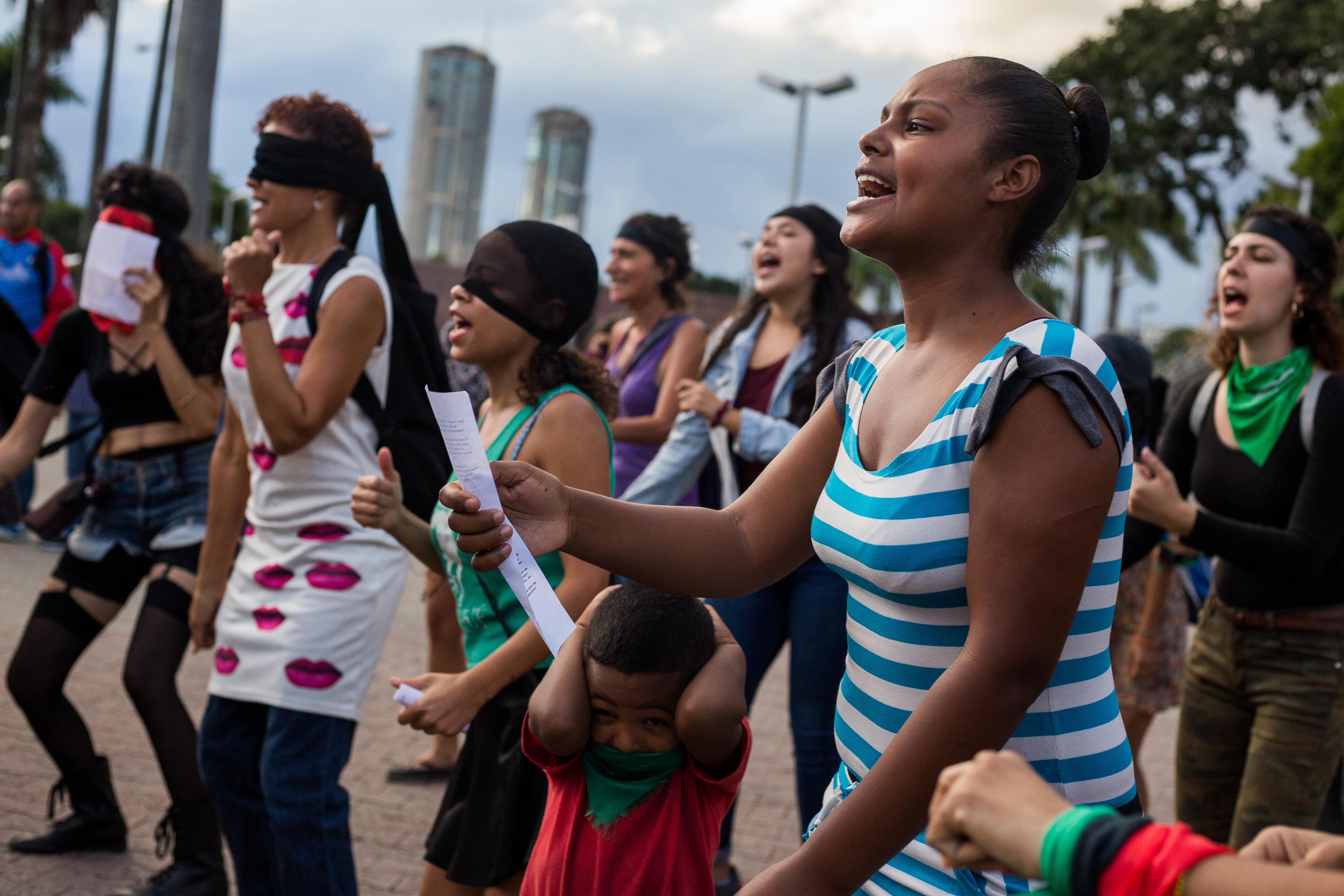
“Un violador en tu camino” became a new anthem for women who openly face their aggressors. Photo: Cristián Hernández. Plaza Venezuela, 2019.
The call to protest on Friday, in Caracas, with the Revolutionary Feminist Movement was made by En Tinta Violeta, Comadres Púrpura, Brigada Latinoamericana Feminista, Faldas-R, Tejiendo Mujeres, La Araña Feminista and La Quinta Ola, after the invitation to another protest, opposition oriented, was made for Saturday by Hermanas Naturales, We Lab and Uquira.
Both demonstrations handled the same demands, the same audience and the same performance, but they remained divided by two different calls and alliances. “It is clear that we’re all chavistas, and we’re all revolutionary. No one from the Right is here today,” yelled one of the organizers on Friday, while distributing the modified lyrics of the song. “We identify with the Left, and separated the two protests because many didn’t feel comfortable joining an opposition event. The demands are the same, the narratives are not,” said Sharon Lara, 24, a member of La Quinta Ola.
This division, and the mere fact that the protest was called, caused negative comments on social media. “Since we made the public call, there was an onslaught of comments, with a classist and sexist language,” says Maritza Rivero, 27, member of En Tinta Violeta and one of the organizers of the chavista event, who adds that the harassers lived in Eastern Caracas according to their online profiles, although it’s not common for people to share their address on social media.
While discussing the lyrics on Friday, a man asked for the floor to talk about the importance of not politicizing the movement, and was categorically silenced by the organizers: “A man will not tell us what to do.”
Meanwhile, the reporters covering the event, almost all men, kept their distance. Some were singing a version of the song that refers to the rapist as the refined sugar that fattens women. Others spoke derisively about the need for a movement for the rights of men (“if we continue like this, we’ll end up jailed,”) constantly justified their presence (“I came because this meant two days of easy work,”) or commented on the physique of demonstrators (“You think the feminist movement also rejects deodorants?”). This only meant a harder time for them when doing their jobs: “I was taking the picture of a girl up close, and I only approached because a female photojournalist was next to me. They removed me from the set up, yet the female photographer got to stay,” said a local photojournalist.
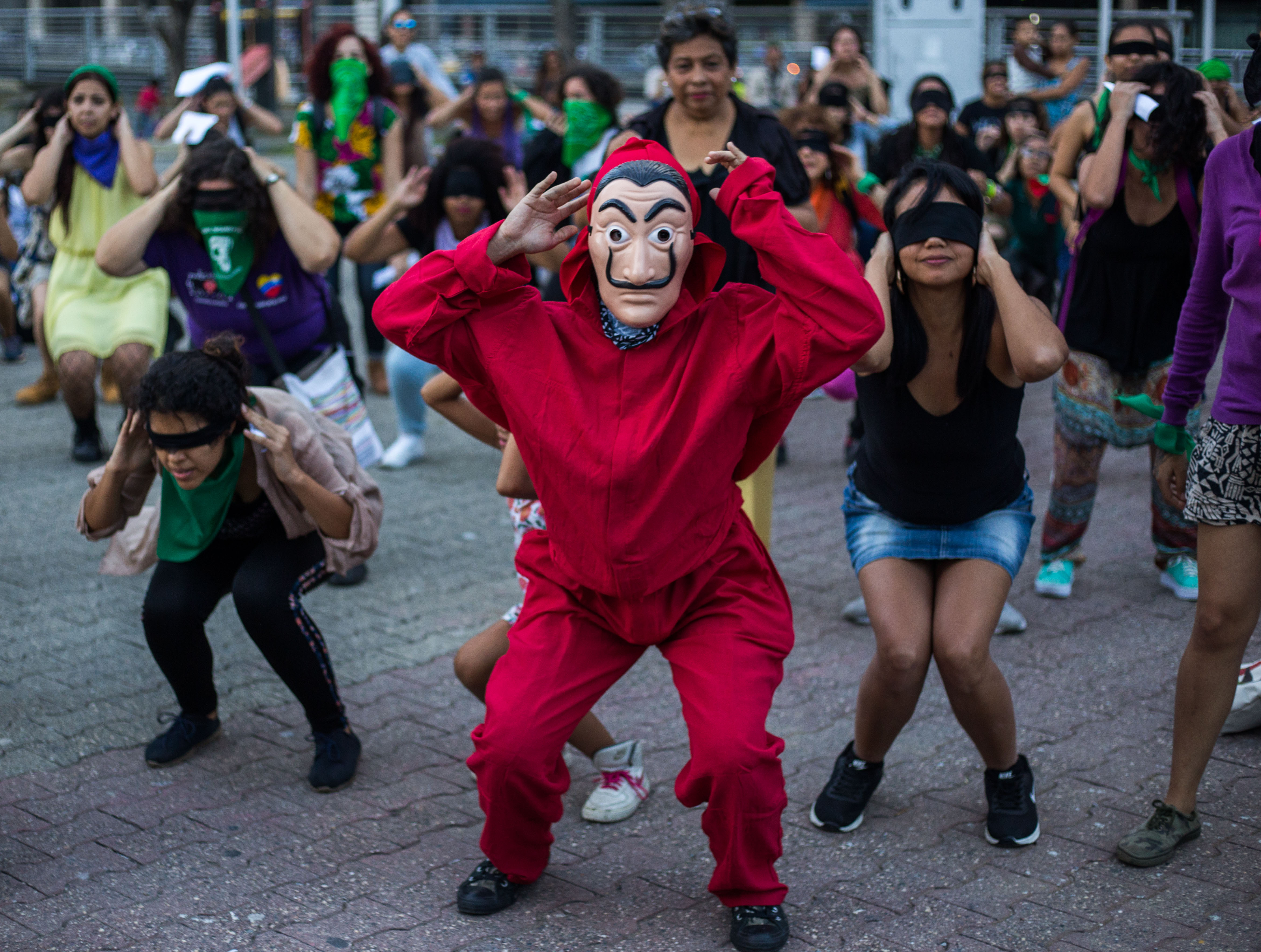
After rehearsals, in the first official presentation, two masked people who weren’t part of the event tried to sabotage it by dancing reggaeton. Photo: Cristian Hernández. Plaza Venezuela, 2019
But the event that highlighted the toxic gender dynamics came when four cameramen interrupted the demonstration’s rehearsal by fighting and yelling at each other. The heated argument only ended when one of the organizers separated them, screaming that no macho fights would be allowed in that space. Her voice was heard throughout Plaza Venezuela and imposed silence, followed by applause and nervous laughter.
After rehearsals, in the first official presentation, two masked people who weren’t part of the event tried to sabotage it by dancing reggaeton.
If the demonstration and performance seeks to mirror and expose the problems and seams in our society, it succeeded.
The Next Day, at the Other End of the Boulevard…
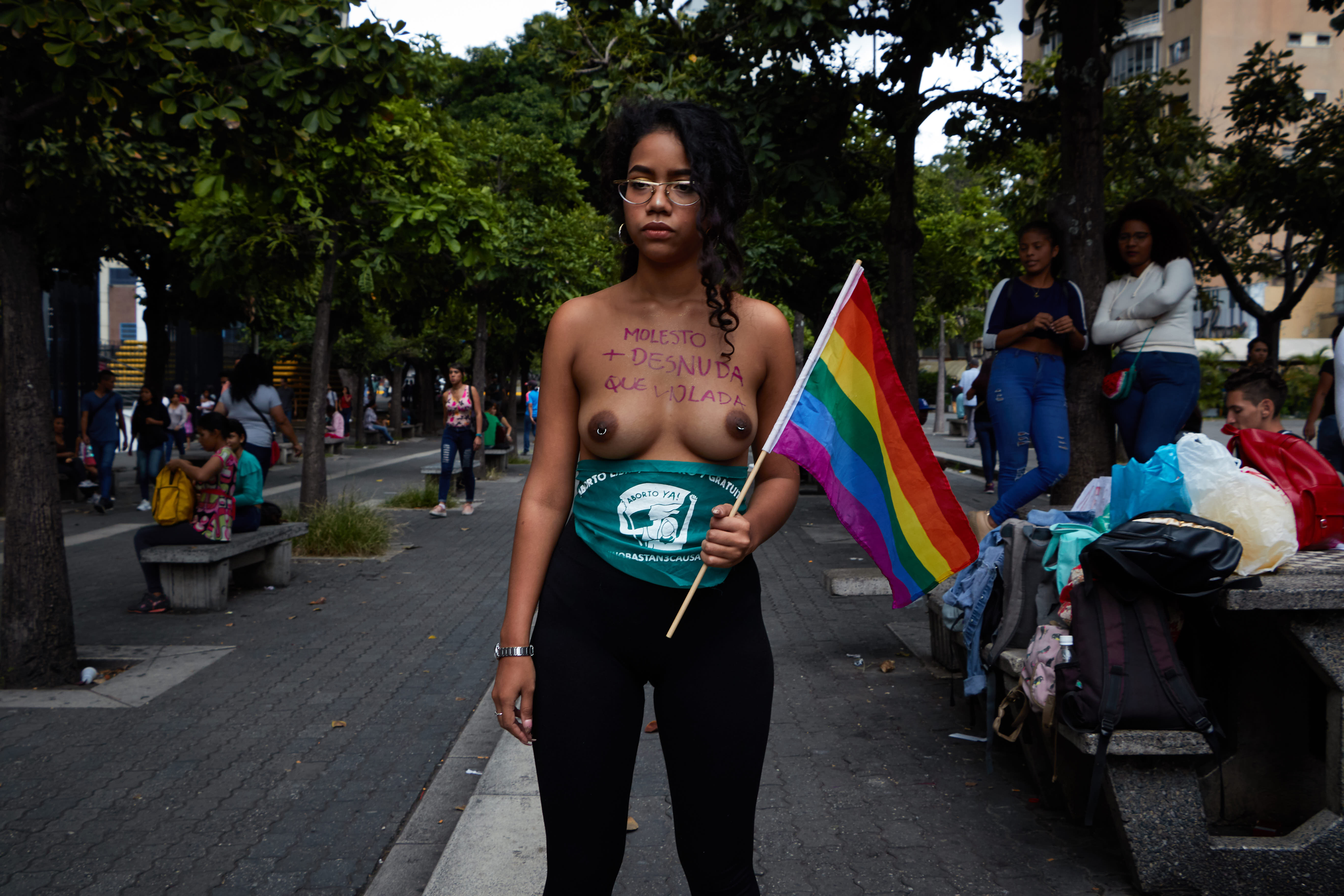
“I annoy you more by being naked than by being raped.” Andrea Paola exposed on Twitter how, at 21, a police officer in Anaco arbitrarily detained her and took her to his home. Photo: Daniel Blanco. Chacaíto, 2019.
The second demonstration, on Saturday, flowed smoothly despite the rain. 40 women and men met in Chacaito’s Brión square, to sing the original lyrics of the LasTesis song. They ended by making a statement about the inclusion of men in the feminist movement. “The important thing about this call is the non-ideologization of the fight. The feminist movement does not depend on the Left or Right wing, it’s about our fundamental rights that are being systematically violated. The division does not improve the situation,” says Vanessa Vargas, 37, a member of We Lab.
Hermanas Naturales also believes in joining forces when it comes to human rights. “We’re not interested in making a partisan movement. We all have the same fight. We’re interested in sorority. When we say that ‘you are the rapist,’ we talk to aggressors and the system that protects them. We don’t talk about gender, ideology, religion, parties. We invited all organizations to participate with us, but there was a need for division. We went yesterday and took part in their protest,” says Carlos González, 24, a member of the Hermanas Naturales. In the background, a woman with a PSUV bandana walked among demonstrators.
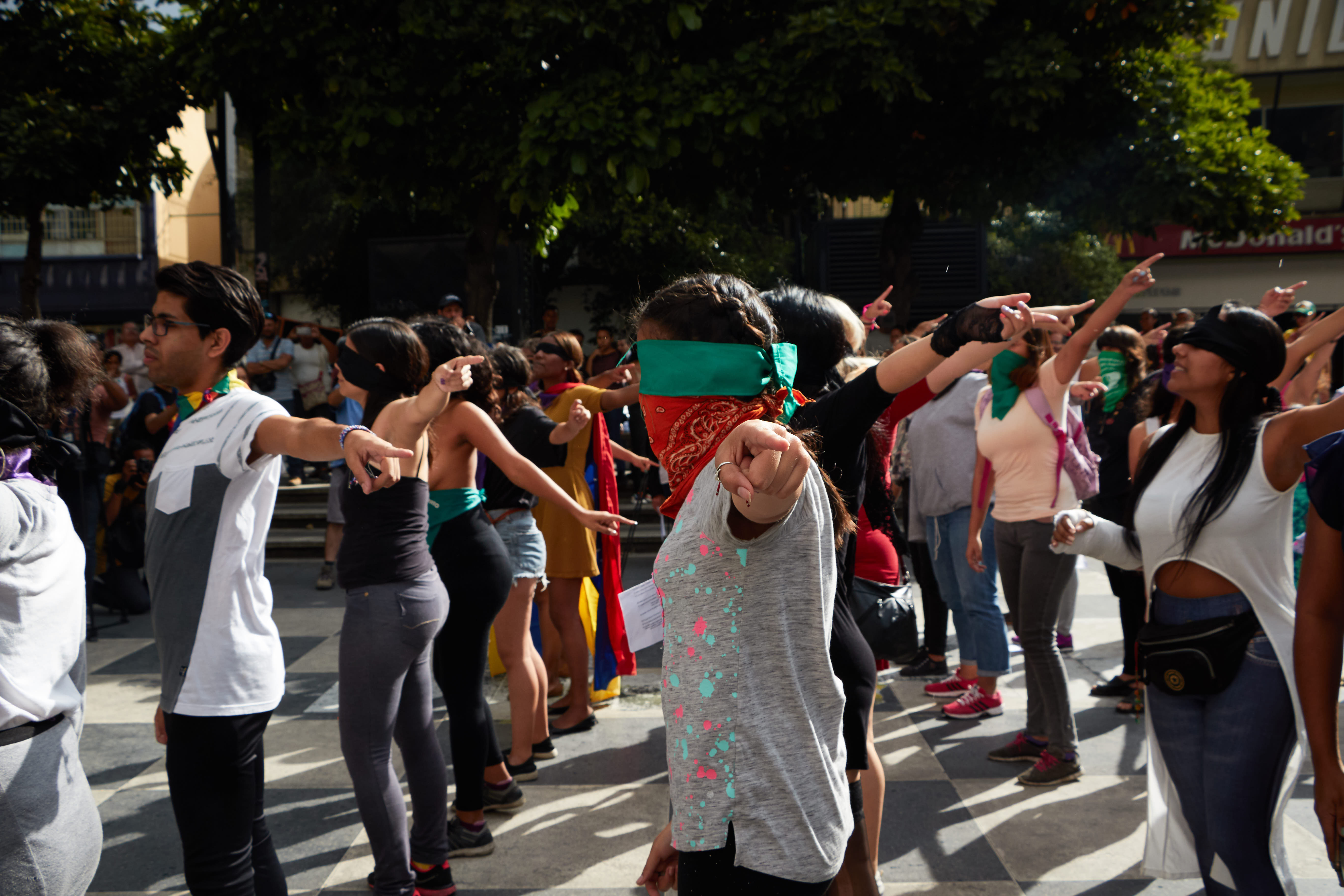
“We’re not interested in making a partisan movement. We all have the same fight. We’re interested in sorority. When we say that ‘you are the rapist,’ we talk to aggressors and the system that protects them. We don’t talk about gender, ideology, religion, parties. Photo: Daniel Blanco. Chacaíto, 2019.
Both protests are born in a context of worsening living conditions for Venezuelan women because of the humanitarian emergency. The political, economic and social crisis has hindered debates about abortion, equal marriage, better management from the authorities against sexual and gender-based violence. Both demonstrations demanded public figures of femicide (which have not been updated since 2013), safe and free abortion, better laws for the protection of women and a serious involvement by the state to combat sexual aggressions and all gender violence.
Compared to calls in other countries of the region, both events had low attendance. “I don’t consider the movement to be weak, I think there’s still a long way to go,” says protester Andrea Paola Hernández, 24, with her abdomen covered with the green bandana of the pro-abortion movement and a message written on her chest: “I annoy you more by being naked than by being raped.” Andrea Paola exposed on Twitter how, at 21, a police officer in Anaco arbitrarily detained her and took her to his home. “In the country, and in the world, women are murdered and raped and the state does nothing. There are no numbers, there are no public policies, there are no campaigns. No one cares about us, except ourselves.”
Truth is that both protests reveal the current obstacles of Venezuelan feminism: political sectarianism prevents the forging of alliances, and blocks the state on everything that’s also requested from the opposition; the harassment in social media, from men and women inside and outside the country, against any public act of the feminist cause; the darkness in information, as strong today as it was decades ago; and the coverage of these issues by the media, which help to inhibit public debate and the implementation of policies.
But at least it wasn’t for naught: the visibility of problems begins when we can sing, openly, about the absurd recurrence of sexual abuse, state practices that protect aggressors, and the social silence that normalizes it.
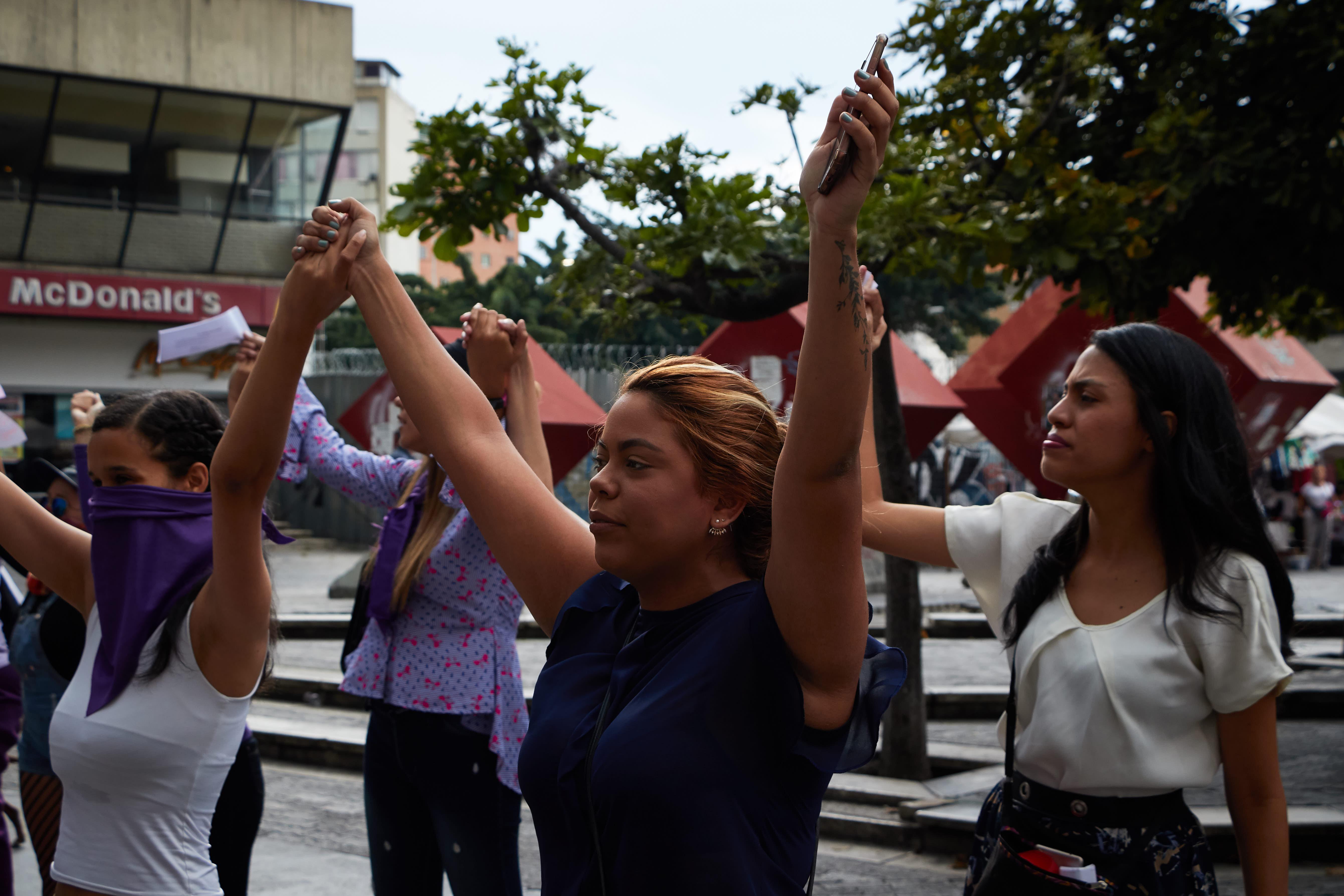
Both protests reveal the current obstacles of Venezuelan feminism. Photo: Daniel Blanco. Chacaíto, 2019.
Caracas Chronicles is 100% reader-supported.
We’ve been able to hang on for 22 years in one of the craziest media landscapes in the world. We’ve seen different media outlets in Venezuela (and abroad) closing shop, something we’re looking to avoid at all costs. Your collaboration goes a long way in helping us weather the storm.
Donate




